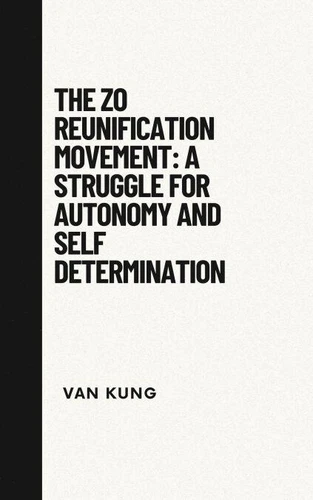Nouveauté
The Zo Reunification Movement: A Struggle For Autonomy And Self Determination
Par :Formats :
Disponible dans votre compte client Decitre ou Furet du Nord dès validation de votre commande. Le format ePub protégé est :
- Compatible avec une lecture sur My Vivlio (smartphone, tablette, ordinateur)
- Compatible avec une lecture sur liseuses Vivlio
- Pour les liseuses autres que Vivlio, vous devez utiliser le logiciel Adobe Digital Edition. Non compatible avec la lecture sur les liseuses Kindle, Remarkable et Sony
- Non compatible avec un achat hors France métropolitaine
 , qui est-ce ?
, qui est-ce ?Notre partenaire de plateforme de lecture numérique où vous retrouverez l'ensemble de vos ebooks gratuitement
Pour en savoir plus sur nos ebooks, consultez notre aide en ligne ici
- FormatePub
- ISBN8230620686
- EAN9798230620686
- Date de parution27/07/2025
- Protection num.Adobe DRM
- Infos supplémentairesepub
- ÉditeurIndependently Published
Résumé
"The Zo Reunification Movement" is a powerful and timely exploration of a people divided by colonial borders but united by shared history, language, and identity. Spanning the regions of India, Myanmar, and Bangladesh, the Zo-also known variously as Chin, Kuki, Mizo, and Zomi-have lived for generations across rugged hills and deep valleys, maintaining vibrant oral traditions, clan networks, and cultural continuity in spite of geopolitical fragmentation.
This book traces the story of the Zo from ancestral migrations and early political structures to the disruptive forces of British conquest, missionary influence, and post-independence state-making. Through historical analysis, oral narratives, and contemporary political movements, the book examines how the dream of reunification-whether cultural, symbolic, or political-has remained alive across decades.
It documents the efforts of activists, thinkers, and ordinary citizens who have worked across borders to preserve language, honor heritage, and envision a collective future. From the roots of Zo nationalism to modern challenges of statelessness, marginalization, and diaspora identity, this work provides a comprehensive and compelling account of a movement that is both ancient and urgently modern. Ideal for scholars, policymakers, diaspora communities, and general readers, "The Zo Reunification Movement" is both a documentation of an underrepresented history and a call for recognition, unity, and justice for one of South Asia's most resilient indigenous peoples.
This book traces the story of the Zo from ancestral migrations and early political structures to the disruptive forces of British conquest, missionary influence, and post-independence state-making. Through historical analysis, oral narratives, and contemporary political movements, the book examines how the dream of reunification-whether cultural, symbolic, or political-has remained alive across decades.
It documents the efforts of activists, thinkers, and ordinary citizens who have worked across borders to preserve language, honor heritage, and envision a collective future. From the roots of Zo nationalism to modern challenges of statelessness, marginalization, and diaspora identity, this work provides a comprehensive and compelling account of a movement that is both ancient and urgently modern. Ideal for scholars, policymakers, diaspora communities, and general readers, "The Zo Reunification Movement" is both a documentation of an underrepresented history and a call for recognition, unity, and justice for one of South Asia's most resilient indigenous peoples.
"The Zo Reunification Movement" is a powerful and timely exploration of a people divided by colonial borders but united by shared history, language, and identity. Spanning the regions of India, Myanmar, and Bangladesh, the Zo-also known variously as Chin, Kuki, Mizo, and Zomi-have lived for generations across rugged hills and deep valleys, maintaining vibrant oral traditions, clan networks, and cultural continuity in spite of geopolitical fragmentation.
This book traces the story of the Zo from ancestral migrations and early political structures to the disruptive forces of British conquest, missionary influence, and post-independence state-making. Through historical analysis, oral narratives, and contemporary political movements, the book examines how the dream of reunification-whether cultural, symbolic, or political-has remained alive across decades.
It documents the efforts of activists, thinkers, and ordinary citizens who have worked across borders to preserve language, honor heritage, and envision a collective future. From the roots of Zo nationalism to modern challenges of statelessness, marginalization, and diaspora identity, this work provides a comprehensive and compelling account of a movement that is both ancient and urgently modern. Ideal for scholars, policymakers, diaspora communities, and general readers, "The Zo Reunification Movement" is both a documentation of an underrepresented history and a call for recognition, unity, and justice for one of South Asia's most resilient indigenous peoples.
This book traces the story of the Zo from ancestral migrations and early political structures to the disruptive forces of British conquest, missionary influence, and post-independence state-making. Through historical analysis, oral narratives, and contemporary political movements, the book examines how the dream of reunification-whether cultural, symbolic, or political-has remained alive across decades.
It documents the efforts of activists, thinkers, and ordinary citizens who have worked across borders to preserve language, honor heritage, and envision a collective future. From the roots of Zo nationalism to modern challenges of statelessness, marginalization, and diaspora identity, this work provides a comprehensive and compelling account of a movement that is both ancient and urgently modern. Ideal for scholars, policymakers, diaspora communities, and general readers, "The Zo Reunification Movement" is both a documentation of an underrepresented history and a call for recognition, unity, and justice for one of South Asia's most resilient indigenous peoples.



